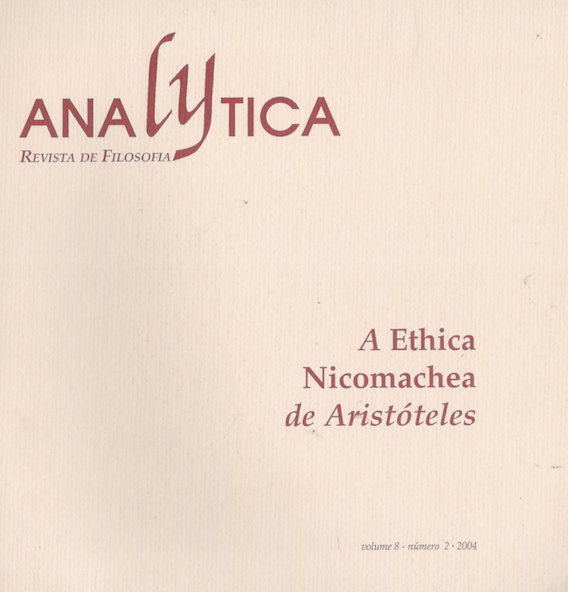O que é a virtude natural? (ETh. Nic. VI, 13)
Resumo
A virtude natural aparece em Aristóteles como alguma coisa que se parece com a virtude sem entretanto se identificar com ela. Ela se apresenta como uma espécie de virtude diminuída, incompleta, posta não como uma alternativa mas antes como um componente da virtude em sentido próprio. Por outro lado, essa virtude é natural e constitutiva de cada indivíduo e determina seu caráter moral (êthos) próprio desde o nascimento. Aborda-se aqui a noção de virtude natural em Aristóteles através de três questões: (a) como se articula a relação entre virtude natural e virtude em sentido próprio? (b) que significa 'natural'? (c) em que medida o papel da virtude natural é determinante para a formação do indivíduo moral? Em outros termos: a ética aristotélica é determinista?
Abstract
Natural virtue appears in Aristotle as something that looks like virtue though, is not being identical to it. It appears as a sort of diminished and incomplete virtue, which is posed not as an alternative but rather as a component of virtue in its proper sense. On the other hand, this virtue is natural and constitutive of each individual and also determines his proper moral character (êthos) ever since his birth. The notion of natural virtue in Aristotle is here approached through three questions: (a) what is the relationship between natural virtue and virtue in its proper sense? (b) what does 'natural' mean? (c) how determinant is the role of natural virtue for the formation of the moral individual? In other words: is the Aristotelian ethics determinist?
Downloads
Downloads
Publicado
Como Citar
Edição
Seção
Licença
Os autores que publicam nesta revista concordam com os seguintes termos:
- Os autores mantêm os direitos autorais e concedem à revista o direito de primeira publicação, com o trabalho simultaneamente licenciado sob a Licença Creative Commons Atribuição-SemDerivações 4.0 Internacional (CC BY-ND 4.0), que permite a redistribuição, comercial ou não comercial, desde que a obra original não seja modificada e que seja atribuído o crédito ao autor.
- Os autores têm autorização para assumir contratos adicionais separadamente para distribuição não-exclusiva da versão do trabalho publicada nesta revista (ex.: publicar em repositório institucional ou como capítulo de livro), com reconhecimento de autoria e publicação inicial nesta revista.
- Os autores têm permissão e são estimulados a publicar e distribuir seu trabalho online (ex.: em repositórios institucionais ou na sua página pessoal) a qualquer ponto antes ou durante o processo editorial, já que isso pode gerar alterações produtivas, bem como aumentar o impacto e a citação do trabalho publicado (Veja O Efeito do Acesso Livre).


